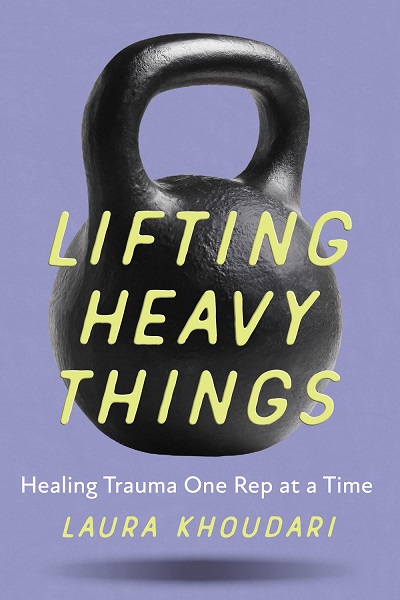
Laura Khoudari’s new book, Lifting Heavy Things: Healing Trauma One Rep at a Time, at first glance would appear to be an entry in the nonfiction sub-genre of advice, physical therapy, and leadership. But don’t judge a book by its cover, and don’t let your biases fool you. What Khoudari has accomplished with the publication of Lifting Heavy Things is not just a book emphasizing the importance of specified, tailored workout regimes. It’s a first person-narrated look at trauma – what causes it, the impacts it has on mind, body, and soul, and what someone can do about said effects on both a physical and physiological set of levels. Khoudari’s heart is evident not only in her putting a human face on something that easily could have been a decidedly anti-visceral, wholly unsentimental read, but in the sparing accounts of the various clients she has helped on the road to recovery.
Overcoming trauma, she writes, is a dynamic process that extends far beyond physically therapeutic means. It is about a total and utter reevaluation of one’s self, one’s regimen, and one’s relationships in the immediacy of their environment. It really is something of a psychologically-based journey, the physical aspects of such a journey merely conduits to a far deeper and more meaningful outcome. In the book’s fourth chapter, Khoudari focuses on this sort of theme by way of what she calls ‘orienting techniques’. “(Orienting) is something you do instinctively under threat, but it can also be done intentionally when you need to come back to the present moment and demonstrate to yourself that you are safe,” she writes. “It’s a tool you can use no matter where you are.” Indeed, this is where the most evanescent qualities in stark comparison to the physical come into play.
AMAZON: https://www.amazon.com/Lifting-Heavy-Things-Healing-Trauma/dp/192805577X
Khoudari makes it clear that she’s not just coming from a neurophysical angle, but also an acutely psychotherapeutic one as well. She utilizes hypnotherapeutic qualities for her ‘orienting techniques’ as much as she does physical (i.e. using everyday objects for certain, grounding positions and related body work). It’s an effective mix that feels holistic but never out-and-out maudlin, something almost homeopathic in its ideological origins but never out-and-out simplistic or overly spiritualistic. “When you encounter a new stimulus…you’re naturally drawn to it,” Khoudari writes in the vein of this. “…We all need to feel safe in our body and our environment in order to do healing work. Orienting…is one way you can achieve that.”
Safety is a recurring word in Khoudari’s read. This is likely due to the book’s fixation with the origins of trauma, and its articulations and ruminations on the fact that trauma is a natural state of response. It doesn’t demonize what is theoretically ‘wrong’ with its targeted audience, but rather simply states the necessity of righting certain aspects within one’s self that no longer directly correlate to the immediacies of one’s environmental stimuli. In Khoudari’s eyes, trauma is when the brain is continuously primed to be ready to intercept a threat. The key when danger is no longer present is to help transition one’s self back to a state of neutrality, so that one’s life does not mirror their negatively biased, subconscious interpersonal calculations. The result, she states, is that you needn’t be defined by what has marred you in the past. While trauma itself is not something to view as inherently demonic, she writes, it can ultimately be compartmentalized so it’s only a part of your reality – not all of it. Amen to that.
Cyrus Rhodes



























